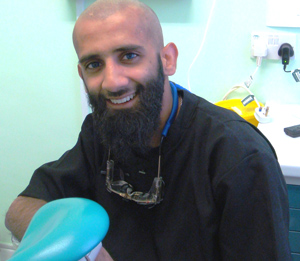
Mohammed Samad, a graduate from Dundee dental school, reflects on his first 6 months in practice and the ups and downs he experienced.
Comparing life as a foundation dentist to an associate, it is black and white. Whether you stay on at your foundation practice or move on, your mentality will change as to how you think and how you formulate treatment options.
There are some procedures that will not really be feasible mainly due to health service rules. In saying that, foundation does give you an opportunity to hone particular skills which will prove their worth in gold when put to good use.
The biggest problem with moving and taking over a patient list is the endless number of people asking "Are you my new dentist? Where''s my normal dentist?",just seems to go on and on. I've been told and now learnt not to take anything a patient says to heart. I find it a nice touch just to introduce yourself and your nurse to the patient. Even though it won't solve the problem of being asked "Where is the normal dentist?", it makes that potentially awkward moment somewhat less tense.
 At the end of the day, you are the professional, and you will always get patients who demand the treatment they want. Don't be scared to tell them you are not willing to provide it if you feel it's unrealistic or beyond your abilities. The last thing you want is a patient filing a complaint against you early in your career. It doesn't matter how small or futile a case the patient may have, the experience and stress of it is best avoided. There are specialist referral centres and dental hospitals will happily examine that and treat patients who require extensive, complex treatment. Make full use of them as they'll have more resources, time and experience of taking on bigger cases. Reputation counts for a lot. Don't ruin it, word easily spreads.
At the end of the day, you are the professional, and you will always get patients who demand the treatment they want. Don't be scared to tell them you are not willing to provide it if you feel it's unrealistic or beyond your abilities. The last thing you want is a patient filing a complaint against you early in your career. It doesn't matter how small or futile a case the patient may have, the experience and stress of it is best avoided. There are specialist referral centres and dental hospitals will happily examine that and treat patients who require extensive, complex treatment. Make full use of them as they'll have more resources, time and experience of taking on bigger cases. Reputation counts for a lot. Don't ruin it, word easily spreads.
Another potentially tricky hurdle is taking over an on-going treatment plan, especially if it's an extensive plan. Computerised notes can make things easier to fathom what has been done and what needs to be completed. If you have paper records, a good tip is to highlight treatment as it's completed. There is no need for fancy treatments when patient have been content and happy with what they've had for many years. If it's not broken, don't fix it. I have learnt that very quickly on in my career.
If you retain good standards of morals and ethical care, then you are starting on the best foundation possible. Be efficient but don't do things by cutting corners; they will always come back to haunt you. If you need advice or help, you always have you friends and colleagues available and don't feel hesitant about asking for advice. You will never be looked down on, because at the end of the day you have to make sure you look after yourself.